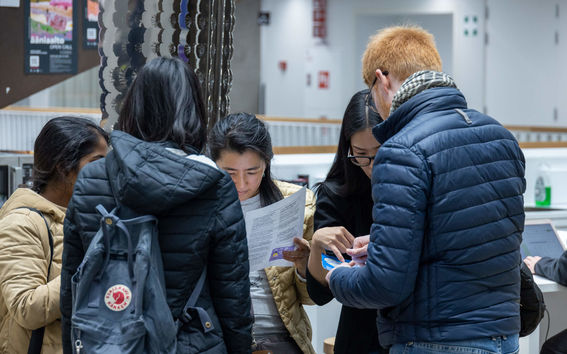Oasis blog: Teach Them to Talk

Higher education culture of studying and teaching has changed radically from what they were two years ago. The online period has increased the flexibility to work beyond the campus, and it has given us new programs and new teaching and learning methods. It has also increased the feeling of loneliness and weakened the sense of community throughout the higher education community. It is a time of transition, but we have a chance to effect modest changes in our work culture, and in our culture for teaching and studying – towards how we want to be looked as a university. In all planning and decision-making, and at every level of activity, a community perspective must be taken onboard.
The sense of belonging is the sum of many things. It is important that people know each other. Getting to know one another depends on people’s interaction. But to start talking to each other, people need time and opportunities.
Studying mainly on campus using group methods will be a new experience for many. At least they will need to get reaccustomed to. Depending on where they are coming from, students will have different kinds of preferences. Their feelings about returning to campus may therefore vary.
For some, this may cause anxiety or even dread. For others, it may represent a long-awaited opportunity to meet others in person. Teachers may also experience these feelings. Hence, teachers should extend a guiding hand and talk about the methods they use in teaching.
Online interactions often provide only a narrow view of other people. The time and opportunity needed for getting to know one another applies also to the student–teacher relationship. It’s important to maintain an honest and open two-way conversation. So, together with students, get to know the principles of ‘safe space’ at the start of a course, and return to review them at regular intervals.
Aalto employees work in a variety of fields. They are, therefore, in a good position to help various groups recover and expand their sense of community. Don’t hesitate to contact an Aalto employee in a particular field if you think they can help.
Tips on supporting the community through teaching:
- Create a recurring routine for interaction. For example, begin and end your course meetings with a conversation. Tell about the method and its meaning for students.Open and active participation by students is a key to their success.
- Choose interactive teaching and study methods, such as splitting up into small groups, or having a ‘go round’ where everyone shares something that’s new with them. Bear in mind that many are not used to this kind of activity in studies, so it may feel rigid or awkward in the beginning.Here are some tips on methods.
- Choose an interesting and well-defined topic for your conversation. It might relate to the course or to something quite different.
- Encourage interaction. Time is needed to get to know one another.
- Time is needed to get to know one another. Leave room also for open discussions.
- Help students get started e.g. by providing a discussion topic or prepared questions.
- Inform students how they contact you, also outside of the teaching sessions.
- Encourage students to get in touch if there is something you should know about relating to them completing the course.
- Make it a goal for each student to find at least one person to get to know.
- Guide the formation of pairs and groups e.g. by asking students to chat someone they haven’t spoken with before.
- Consider randomisation when making small groups: voluntary or self-organized groups are difficult for many, they can be stigmatizing, and they seldom lead to making new acquaintances.
- Remember that it is not only information that we pass on when we teach, but important skills as well – like making new acquaintances, getting to know people and being interactive.
This text is based on teamwork between Aalto’s study psychologists, Teacher Services and the Oasis of Wellbeing project. Study psychologist Paula Sjöblom, specialist Silvana Perez Läherinta and community developer Tiina Pylkkönen made the final revision.






